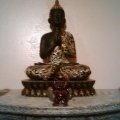What if Westerners had learned one Noble Truth that is made up of four parts?
 Ren_in_black
Georgia Veteran
Ren_in_black
Georgia Veteran
**Prelude here to say that I DON'T think I have a better way of teaching Buddhism. 
I have recently wondered for myself, and so also for other curious Westerners, if it wouldn't have been better to hear the Four Noble Truths as One Noble Truth made up of four parts. Inseparable by numbers or anything else.
I think the understanding that "suffering" is not the correct word to express dukkha has become more widespread these days. But there is still that opportunity for learners to hear "birth is unsatisfactory, daily life is stress, aging is painful" etc., etc., to think, "No, I don't agree with this, and if #1 is a flawed premise then #2-4 won't work either."
But that chance to question the premise, I believe, comes from an understanding that the First Noble Truth, while forever bound to a sequence, yes, is a standalone idea that is being bound.
This may seem like semantics but I think it's deeper than that. And it's probably only a problem for some learners and not others. But I wish there wasn't any opportunity to stop what appears to be a sequence. Like a pie that you can cut into four pieces and eat one by one to know the whole.
To me the Four Noble Truths are more like a basketball or a baseball. If you only begin with, or separate 1/4 out of, the thing then it is no longer the thing.


Comments
I wouldn't identify as a westerner or as any other other but I get what you mean. For me, the 4th NT is the logical solution to the 1st NT. There is the problem, the cause of the problem, the realization that if there is a cause there is a solution and then there is the solution.
That is how Thich Nhat Hanh also sees it (possibly a big part of why he has such a western following) and why he says using suffering or dukkha as a dharma seal is an error. If there is a cause of dukkha and a way to change conditions leading to said cause then how could dukkha or suffering be a true mark of existence?
If things are unsatisfactory, that is because of how we see our relation to them. The problem is not with the things we attach to, the problem is in the mind that grasps. The flower does not suffer because we cannot reach to pluck it and it is not unsatisfactory because of our perception.
Three Marks of Existence are impermanence, non-self and nirvana and it makes sense if the whole premise of the 4 NTs are taken together as a whole as you suggest.
Much gratitude for this thread.
A good take on TNH’s version of the NTs.
The Four Noble Truths, instead of one Truth with 4 parts ... comes from the oral tradition of Buddhism. With few people being able to read, they had to memorize. So Buddhism is FULL of the 4 This, the 8 That, the 81 Whatevers, etc. They like to list things off, these Buddhists. They will pick someone apart into hundreds of pieces and then memorize it.
I guess literate people get lazy, mentally.
As for understanding the 1st Noble Truth until you DO see this operating in your life, not as an intellectual concept but as an experience or realization .. the next 3 Truths don't seem very important. If you are not fully aware of the inescapability of discontent/suffering in your life, you aren't going to care about fixing the issue.
I like the concept of the Eightfold Noble Path being like the spokes on a wheel. All equal and interdependent. I think that's how the Four Noble Truths should be portrayed. That's just my view though.
True but I think people hear about something being inescapable and decide they'd rather not have full awareness, better to reject it at Point A and take a different road altogether.
Maybe modern translations should include additional modern phrasing, such as "But hear me out..."
Yes, I have heard many people describe Buddhism as 'depressing'. It takes more than "ah but hear me out..." to convince them otherwise.
I think people prefer the comfort zone of their own ignorance, than have to stop, sit, listen and think about what that truly means... With some, it's a fear of finding out that it's true. With others it's a denial, because that would mean they would have to question everything about their own faith, and worry about a more logical alternative...
I think when we see the 1st NT as an inescapable truth we see the other NTs as separate truths instead of one remedy with four steps. For me personally, it always felt as if the Buddha is saying that in life there is dukkha/suffering, not that life is all suffering. After all, he had supposedly found the way out without physically passing away. So then at the time of the teaching, all life was not suffering since he himself had realised its cessation.
The history of the popularisation of Dharma is beginning.
We who practice, study, except the broad and subtle strokes, will determine the nature of its application to our situation.
That is why the Western 4 Noble Truths might be:
https://en.m.wikipedia.org/wiki/Buddhist_paths_to_liberation
What the duck are you on about?

Don't mind him, he's quackers. You wait until his Psychiatrist sends him his bill. He'll have to dig into his nest egg... but he's harmless. Just a great big platypussy.
I seem to have heard (where? exactly) that Buddha says he taught suffering and the end to suffering. But that isn't the same as to say that everything we perceive/experience is suffering.
Recently listened in on a talk where a Lama says that this cessation of suffering there isn't really a word for it. "peace" is a pointer to the moon but it is something that one should look into for themselves rather than say it is so because they're supposed to say it ...as I'm doing now I suppose.
A more technical word than "peace" would be nisprapancaya but I haven't read up on that so much to explain/understand. Actually I could only find a Hindu sort of reference to nisprapancaya https://en.wikipedia.org/wiki/Nishprapanchaya. But nis refers to "not" and a Buddhist sense of prapanca is https://en.wikipedia.org/wiki/Conceptual_proliferation